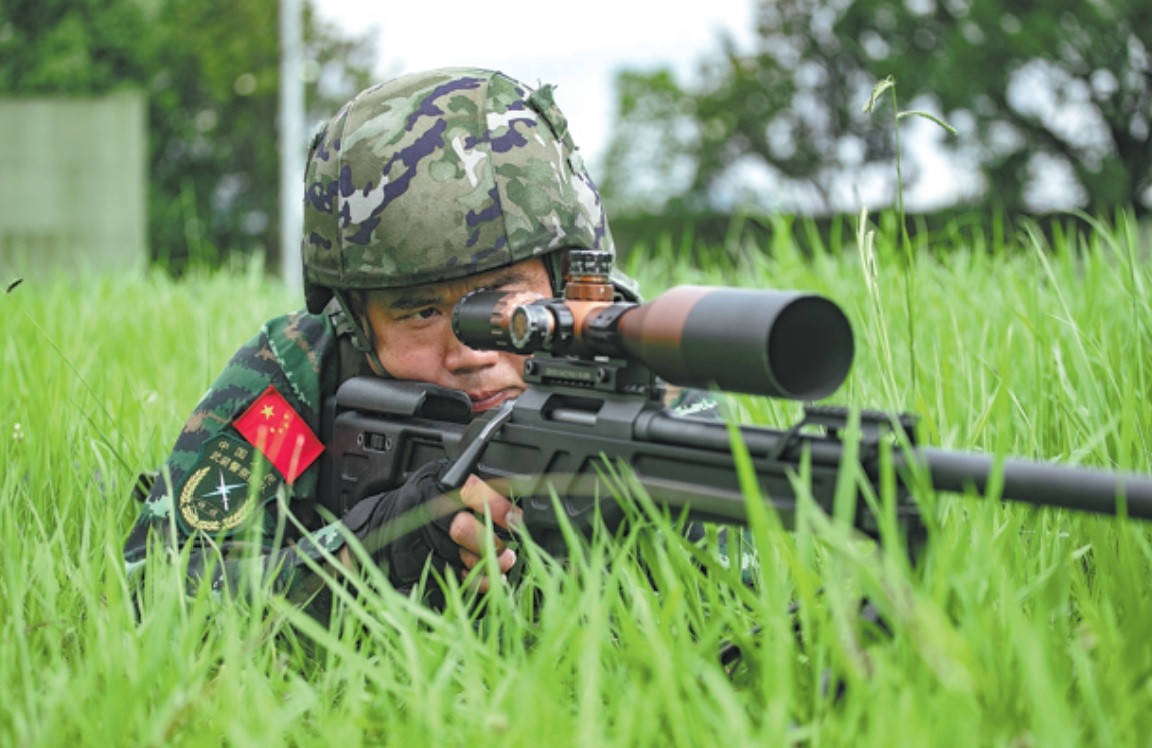Would-be teacher finds success as elite sniper


Twenty-five years ago, Li Xingkun initially had plans to teach school, not shooting, for a living.
Now 46, the star sniper with the Guizhou province branch of the Chinese People's Armed Police Force issues a crisp command during a live drill: "Eliminate the target!"
On the training ground, his sturdy build and piercing gaze depict a toughness that masks his scholarly past. Supported by armored personnel and under the cover of tear gas delivered by drones, Li's special operations unit moves through a mock urban block. They bomb a door, secure the building and press on.
Simultaneously, members of his sniper team reach their firing positions. Working in pairs, they engage each target.
Li's signature training method blends drones, vehicles and infantry into a single, seamless force. He designed the exercises to sharpen his unit's ability to integrate new technologies into urban counterterrorism missions.
The Chinese People's Armed Police Force, a militarized body that handles sudden public security crises, engages in counterterrorism activities, enforces maritime rights and leads disaster relief efforts.
Now a seasoned soldier in the force with the rank of Senior Corporal III, Li oversees both reconnaissance and marksmanship courses. His tough standards have earned him a reputation as the unit's drill sergeant.
"He is endlessly curious and demands absolute precision," said Xu Lele, one of the trainees.
Li grew up in rural Hunan province. Inspired by the National Day military parades he watched in 1999, he enlisted after graduating in 2000.
"Seeing those soldiers in full dress made my heart race. I knew that was what I wanted," he said speaking in the dialect of his hometown, where stories of military heroism have long inspired generations.
At last, Li fulfilled his wish and joined the Armed Police. Military life, however, wasn't as glamorous as he had imagined it would be.
"When he arrived, he was bookish and ordinary," the officer in charge of Li's induction cohort recalled. "Many of the drills were real challenges for him."
The rookie was determined to improve and added extra workouts to his routine. When selection time came for the special operations unit, he outperformed more than 300 recruits to earn his place.
During his service in the special forces, Li mastered sniper tactics, close-quarters combat and rope descents. In one evaluation, he topped both the rock climbing and handgun shooting events, even getting a perfect score in a 10-round expert shootout.
As he honed his physical skills, Li applied his teaching experience, studying and sharpening each tactic and guiding his fellow soldiers. His classroom background fueled an innovative drive that not only advanced his own capabilities but also pushed the entire unit beyond the ordinary.
In 2010, a hostage crisis abroad trapped tourists in hijacked buses, resulting in casualties as police intervened at the scene. Watching the events unfold, Li — the acting platoon leader for reconnaissance at the time — realized that in such cases, ground forces struggle to approach hostages in open terrain without cover.
Seeking a solution, he invented a tactic using drones to deliver tear gas directly into a hijacked vehicle.
"Accurate delivery requires hovering and targeting in real time," Li explained.
Working with his team, he modified drones to carry gas canisters and fire them with pinpoint precision.
After repeated testing, they mastered the technique and could send gas cluster rounds consistently through mock bus windows.
Another challenge was shooting precisely through vehicle glass, especially on buses, without endangering hostages.
"At typical ranges under 50 meters, the type of glass can alter trajectories, and its effects on light can affect aim," he said.
He and his team conducted thousands of live-fire tests at varying distances and with different glass thicknesses and shooting angles. From these experiments, they developed a correction chart for barrier penetration.
"After a lot of practice, we hardly ever miss when shooting through glass," trainee Xu recalled.
The bus anti-hijacking technique Li introduced has been adopted throughout the Armed Police.
Now middle-aged, Li cannot escape the physical effects of getting older. "I will do everything I can to pass my skills on to others," Li said. "When the Chinese people face danger, I want my soldiers ready to protect them. That has always been my mission."






























